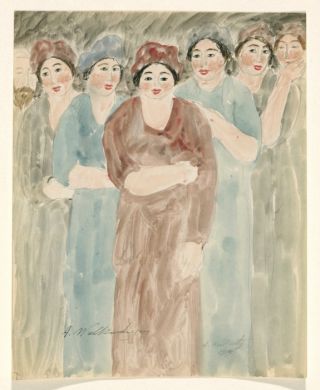Decision-Making
If Only: Dealing with Unexpected Situations
When confronted with life-changing events, women often plunge ahead.
Posted November 1, 2012

Standing Women, Abraham Walkowitz (Yale)
In crisis situations, women can become highly creative or guilt-ridden. But they plunge ahead. Although people often have no opportunity to prevent a crisis, women can fall into the trap of thinking that they could have been better prepared – the “If-only” syndrome. How does this happen in crisis? Women often talk themselves into believing that they could have minimized the disaster. When natural disasters occur with the weather, sometimes we are given warning and sometimes not. Preparedness is often key to survival. But what about situations for which one is not prepared?
The “If-only” anxiety:
Sometimes women are hit with crisis information at a time when they cannot reasonably process a situation to develop reasonable alternatives. Women have often said to me:
- If only I had been more attentive to my husband.
- If only I had paid more attention to my checkbook.
- If only I had stopped to consider what was going on.
- If only I hadn’t let my child with a sitter.
- If only I had gone on that business trip with my husband.
- If only I had not given so much allowance money to my children.
“If-only” leads to a counterproductive thought pattern that further victimizes victims. Self-esteem takes a hit. This thinking creates a vulnerability that translates into anger, depression, and guilt – feelings that can immobilize and stifle decisions that must be made in order to move forward.
The first step, alone or with help:
If you happen to be one of those resilient women who, when hit with a crisis, can say, “It’s all right, I can live with this. This too shall pass,” then you are already on a positive path.
But some women, while putting a positive face forward, internally are in pain. Those experiencing severe anxiety and pain are being given a message by their body which is saying, “You really cannot live with this at the moment.”
What to do? Seek out professional help or the help of a trusted friend until you are able to make a decision that makes you feel good about yourself. Everyone owes it to themselves to find alternatives that give them a certain peace of mind.
The decision-making process:
Decision-making is stressful. Change, even for the better, is stressful. Many women have said that all they can handle is a pros and cons checklist after getting over the initial shock of a crisis.
Sometimes generating alternatives is too much like being on overdrive and can be an overwhelming task. Nonetheless, alternatives are useful because they help us take a confident step forward. Additionally, becoming accustomed to a process prevents one from looking back and saying, “If only.”
Think of alternatives as a simple brainstorming session. Oftentimes in business meeting brainstorming sessions, we reject more than half of the ideas. Then someone makes a suggestion and you say, “Wow, that’s terrific. Why didn’t I think of that?”
Alternatives help us “think of that,” and facilitate the follow-through. I have written about decision-making as The TACT Strategies.
- Think a minute -- let your mind settle.
- Assess the situation -- gather information.
- Consider alternatives -- generate options.
- Take a stand -- follow-though with confidence.
Making decisions is about making choices. A valuable method is a decision-making style that combines a logical process with women’s intuition, that voice within, that feeling of knowing, just knowing.
(From “The Art of Decision Making: 20 Winning Strategies for Women” by Rita E. Watson, which is currently being updated and adapted and rewritten for an e-book.)


